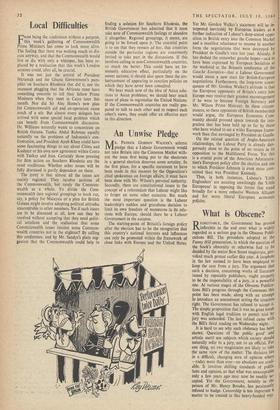An Unwise Pledge
MR. PATRICK GORDON WALKER'S solemn pledge that a Labour Government would not take Britain into the Common Market with- out the issue first being put to the electorate in a general election deserves some scrutiny. In the first place, for a specific statement to have been made in this manner by the Opposition's chief spokesman on foreign affairs, it must have been done with Mr. Wilson's personal authority. Secondly, there are constitutional issues in the concept of a referendum that Labour might like to forget on some other occasion. But much the most important question is the Labour leadership's sudden and gratuitous decision to limit its own freedom of manceuvre in its rela- tions with Europe, should there be a Labour Government in the autumn.
The starting-point of Britain's foreign policy after the election has to be the recognition that this country's national interests and influences can only be promoted within the framework of close links with Europe and the United States.
Yet Mr. Gordon Walker's statement will be in- terpreted inevitably by European leaders as a further indication of Labour's deep-seated oppo- sition to British entry into the Common Market and a manifest reluctance to resume in another form the negotiations that were destroyed by President de Gaulle's veto last year. Already, it has dashed the somewhat gauche hopes—said tO have been expressed by European Socialists at the weekend at the Brussels conference of the Gauche Europeen—that a Labour Government would mean a new start for British-European negotiations. Furthermore, the long-term conse- quence of Mr. Gordon Walker's attitude is that the European opponents of Britain's entry into Europe may receive their greatest encouragement if he were to become Foreign Secretary and Mr. Wilson Prime Minister. In these circum- stances, so these opponents of British membership would argue, the European Economic Com- munity should proceed apace towards the inte- gration that has been held up so far by those who have wished to see a wider European frame- work than that envisaged by President de Gaulle.
On the related question of Anglo-American relationships, the Labour Party is already dan- gerously close to the point of no return in its opposition to the Multilateral Force. Yet this is a crucial point of the American Administra- tion's European policy after the election and one to which President Johnson is even more com- mitted than was President Kennedy. Thus, in both instances, Labour's 'Little Englanders' are assisting unwittingly the 'Little Europeans' in opposing the forces that stand broadly for a more cohesive Western Alliance and for more liberal European economic policies.










































 Previous page
Previous page